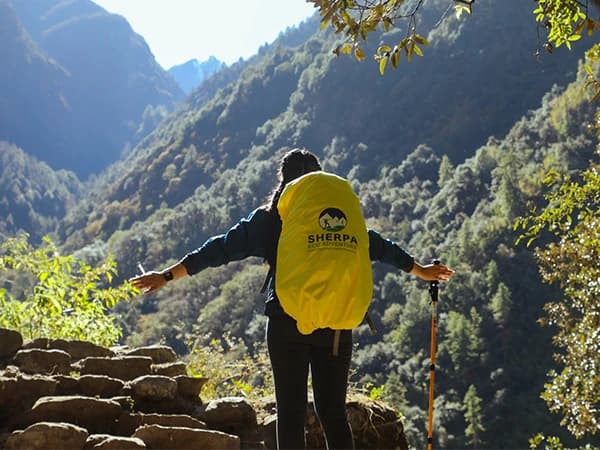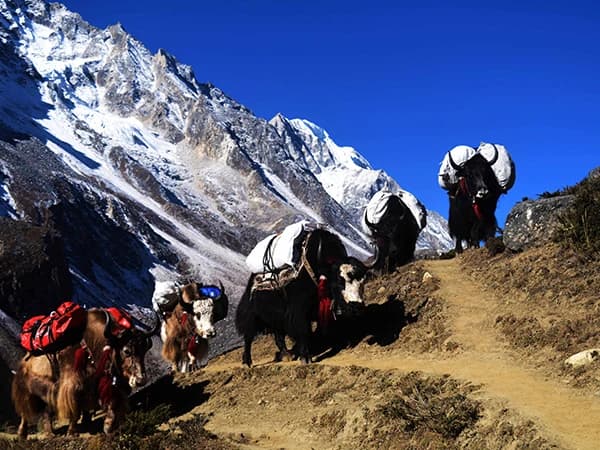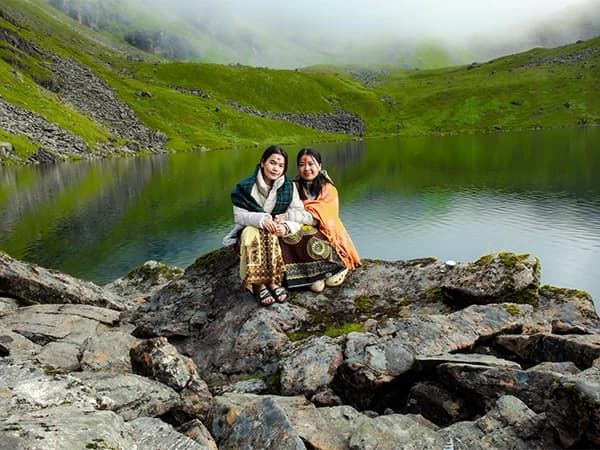Respect for Nature
Nepal's unparalleled natural beauty stands as its most cherished treasure. It is incumbent upon every traveler to honor and safeguard this environment by adhering to responsible practices while exploring its majestic landscapes. This entails remaining on designated trails during treks, abstaining from any act of littering, and ensuring the preservation of the delicate balance of flora and fauna. Embracing the ethos of "leave no trace," it is imperative to meticulously collect and carry out all waste, including biodegradable items, thereby ensuring the pristine sanctity of Nepal's wilderness remains intact for generations to come.

Support Eco-Friendly Initiatives
Choose to lodge in environmentally conscious accommodations that prioritize sustainable practices, including the utilization of renewable energy sources, conscientious water conservation measures, and the implementation of effective waste management strategies. Show your support for local enterprises dedicated to eco-tourism by patronizing establishments that actively contribute to conservation initiatives and promote responsible tourism practices aimed at preserving the natural beauty of the region for future generations to enjoy.
Reduce Plastic Usage
Nepal grapples with considerable hurdles in combating plastic pollution, a pressing issue exacerbated in remote and mountainous regions. To mitigate this environmental concern, consider adopting sustainable practices during your journey. Equip yourself with a reusable water bottle to quench your thirst, ensuring to refill it at designated filtered water stations, or purify water using tablets or filters for a safe hydration solution. Additionally, reduce reliance on single-use plastics by embracing reusable alternatives such as bags, utensils, and containers. By making conscious choices, you can play a vital role in preserving Nepal's pristine landscapes for future generations to cherish.
Responsible Waste Management
Dispose of waste in a responsible manner by segregating recyclable items and organic waste from non-recyclable materials. If you find yourself in areas lacking waste management facilities, it's advisable to transport non-biodegradable waste to designated disposal sites in urban areas where proper waste management infrastructure is available. By taking these actions, you contribute to environmental preservation and ensure that waste is handled appropriately, minimizing its impact on the surrounding ecosystem.
Respect Local Customs and Wildlife
Take the time to acquaint yourself with the customs and cultural norms of the local communities to ensure that you interact respectfully and harmoniously with the traditions they hold dear. Avoid any actions that could disturb the natural environment or disrupt the behavior of wildlife, such as feeding animals or participating in activities that may interfere with their natural instincts and habitats. By demonstrating sensitivity to local customs and wildlife preservation, you contribute to the preservation of the delicate balance between humans and nature, fostering a more sustainable and harmonious relationship with the environment.
Support Conservation Projects
Consider actively engaging with local conservation initiatives or lending your support to projects dedicated to safeguarding Nepal's rich biodiversity, preserving wildlife habitats, and conserving its natural resources. By volunteering your time, expertise, or resources, you have the opportunity to play a vital role in upholding the ecological integrity of the country. Your contribution can have a meaningful and lasting impact, ensuring that Nepal's diverse ecosystems thrive for generations to come. Together, we can make a positive difference in protecting and preserving the natural wonders of Nepal.

Choose Sustainable Transportation
When considering transportation options, prioritize eco-friendly modes of travel to minimize your environmental impact. Opting for public buses, bicycles, or shared taxis whenever feasible can significantly reduce carbon emissions compared to single-occupancy vehicles. Additionally, consider carpooling or selecting fuel-efficient vehicles for longer journeys to further decrease your carbon footprint. Embracing alternative modes of transportation, such as exploring destinations on foot or by bicycle, not only promotes sustainability but also allows you to immerse yourself more intimately in the local environment and culture. By consciously choosing eco-friendly transportation options, you can contribute to the preservation of our planet's natural resources and mitigate the adverse effects of climate change.

Educate Yourself and Others
Investing time in educating yourself about the environmental challenges confronting Nepal is crucial. These issues encompass deforestation, habitat loss, and climate change. As you delve into these topics, seize the opportunity to enlighten fellow travelers. Encourage them to embrace sustainable practices throughout their journey in Nepal, fostering a collective effort towards conservation and responsible tourism.
Respect Sacred Sites and Natural Reserves
Numerous locations across Nepal carry profound religious or cultural importance to the local populace. It's imperative to honor these sacred sites, monuments, and natural reserves by adhering to prescribed pathways, refraining from loud disturbances or disruptive conduct, and obtaining authorization before capturing photographs or accessing restricted zones. By demonstrating reverence and mindfulness towards these revered spaces, we uphold the sanctity of Nepal's cultural heritage and foster a harmonious relationship with the communities that hold them dear.

Leave a Positive Impact
Strive to make a positive difference in the destinations you explore by actively endorsing responsible tourism practices, fostering meaningful connections with local communities, and championing sustainable development initiatives that contribute to the well-being of both inhabitants and the environment. By consciously supporting these endeavors, you not only enrich your own travel experiences but also leave behind a lasting legacy of positive change, ensuring that future generations can continue to enjoy the beauty and cultural richness of these extraordinary places.

By adopting these environmental principles, travelers have the opportunity to embark on a profound journey across Nepal, where they not only immerse themselves in its splendor but also play a vital role in safeguarding its pristine landscapes and rich cultural legacy for generations to come. Let's journey with a sense of responsibility, leaving behind a meaningful legacy of conservation and stewardship in the majestic realm of the Himalayas. Together, we can ensure that Nepal remains a beacon of natural beauty and cultural heritage for all to cherish and preserve.









